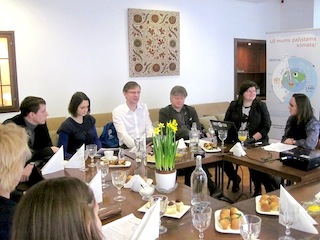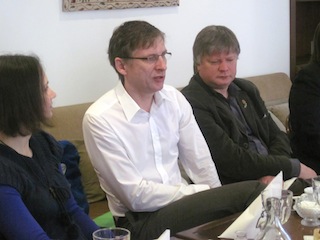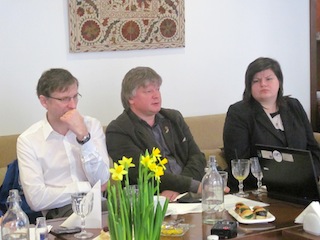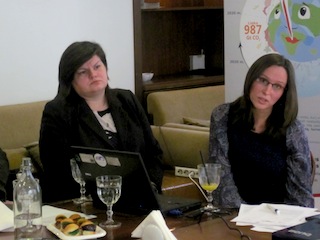Lithuanian NGOs: Lithuania has to support ambitious EU 2030 climate change targets
 Today, 17 NGOs working in the areas of environmental protection and renewable energy, presented their appeal for the President of Lithuania, the Prime Minister, and the Ministers of the Environment and Energy, regarding Lithuania’s position towards 2030 climate change and energy targets. The agreed position will be supported during the European Council. NGOs stressed that it is essential to rely on the latest scientific research and recommendations, and set ambitious EU climate change and energy targets. They also urged to follow the commitment that Lithuania undertook by ratifying the United Nations Framework Convention on Climate Change (UNFCCC) in 2002 – to make appropriate political decisions and actions in order to ensure global warming is sustained within the 2°C limit.
Today, 17 NGOs working in the areas of environmental protection and renewable energy, presented their appeal for the President of Lithuania, the Prime Minister, and the Ministers of the Environment and Energy, regarding Lithuania’s position towards 2030 climate change and energy targets. The agreed position will be supported during the European Council. NGOs stressed that it is essential to rely on the latest scientific research and recommendations, and set ambitious EU climate change and energy targets. They also urged to follow the commitment that Lithuania undertook by ratifying the United Nations Framework Convention on Climate Change (UNFCCC) in 2002 – to make appropriate political decisions and actions in order to ensure global warming is sustained within the 2°C limit.
 Document, which was signed by the 17 non-governmental organizations, proposes three science-based and obligatory national targets for the Lithuanian Government:
Document, which was signed by the 17 non-governmental organizations, proposes three science-based and obligatory national targets for the Lithuanian Government:
To reduce EU greenhouse gas (GHG) emissions by 55% by 2030 compared to 1990. Target proposed by the European Commission (EC), 40% reductions in GHG emissions by 2030, is insufficient to achieve the main objective of the UNFCCC - to avoid global warming of more than 2°C. In order to achieve this objective, the EU has to seek for 95% reductions in GHG emissions by 2050, and 55% reductions by 2030 without decreasing the current GHG reduction rates. Solving the problem of low emissions allowances’ price would also be beneficial.
 Increase the share of renewable energy sources (RES) in final energy consumption to 45% by 2030. EC proposal to achieve 27% share of RES in final consumption, does not show any political will to tackle climate change. Even in the absence of any additional stimuli, a very similar 24% share of RES would be achieved in the final EU consumption. Nationally binding 45% RES target is necessary to fundamentally transform the EU energy system and to provide the needed political certainty to attract investment in energy sector. Lithuania has favorable conditions for the development of RE: as much as half of Lithuania’s energy consumption could be produced from RES by 2030, strengthening its energy independence and creating jobs.
Increase the share of renewable energy sources (RES) in final energy consumption to 45% by 2030. EC proposal to achieve 27% share of RES in final consumption, does not show any political will to tackle climate change. Even in the absence of any additional stimuli, a very similar 24% share of RES would be achieved in the final EU consumption. Nationally binding 45% RES target is necessary to fundamentally transform the EU energy system and to provide the needed political certainty to attract investment in energy sector. Lithuania has favorable conditions for the development of RE: as much as half of Lithuania’s energy consumption could be produced from RES by 2030, strengthening its energy independence and creating jobs.
 Increase energy efficiency by 40% by 2030 compared to 2005. Sufficient GHG emissions reductions can only be achieved, if effective measures to reduce energy consumption are taken by the EU. Compulsory energy savings could provide political certainty that is necessary to attract long-term investment, increase EU energy security, and reduce fossil fuel import costs.
Increase energy efficiency by 40% by 2030 compared to 2005. Sufficient GHG emissions reductions can only be achieved, if effective measures to reduce energy consumption are taken by the EU. Compulsory energy savings could provide political certainty that is necessary to attract long-term investment, increase EU energy security, and reduce fossil fuel import costs.
Organizations supporting these targets affirm that they are weighed and calculated carefully, and based on the most recent scientific research. Last year, the Intergovernmental Panel on Climate Change (IPCC, 2013) introduced a concept of carbon budget[1], and stated that, if the current GHG emission rates remain the same, the warming of 2°C is inevitable in less than 25 years! This will impact on the economic and social well-being of the people that are already living today. “Lithuania can and must support the ambitious targets, so that in the future, we live in a world as stable as possible.” – insisted Gintare Jonusauskaite, Climate Change Expert in Baltic Environmental Forum.
At the moment, the European Union is considering its climate change and energy policy targets for 2020 – 2030. However, the decision will be reached during the European Council summits, the nearest of which will take place on March 21-22, 2014. This is when Lithuania will have to present its proposed targets.
 “Targets that are not ambitious enough also mean poor possibilities to create more sustainable jobs, to reach maximum independence from fossil fuels, and to avoid impact of polluting energy sources on environmental and human health, and life expectancy.” – said Inga Ringailaite, Director of PI “Sustainable Development Initiatives”.
“Targets that are not ambitious enough also mean poor possibilities to create more sustainable jobs, to reach maximum independence from fossil fuels, and to avoid impact of polluting energy sources on environmental and human health, and life expectancy.” – said Inga Ringailaite, Director of PI “Sustainable Development Initiatives”.
Early and ambitious EU decision to seek for a scientifically sound climate change policy targets would prove to be an efficient tool to accelerate international United Nations discussion process towards reaching a worldwide agreement in 2015. It would also give political direction to investors in energy sector, and ensure competitiveness of the EU Member States under political and economic conditions sensitive to climate.
__________
[1] CO2 budget –an amount of anthropogenic GHGs that can be emitted to the atmosphere (including the past emissions since the middle of 19thC) with a good chance of staying within the 2°C warming limit, based on scientific models. 2°C – is a limit of the so called “safe climate”, set by the world’s scientists. According to them, if the average global temperature increases by more than 2°C (compared to the middle of 19thC), extreme climate changes and frequent natural disasters will become inevitable, and will strongly affect further development of the humanity. Up to 2011, we had already used up 2/3 of the CO2 budget. Based on the 5th IPCC report summary for policy makers, 2013: www.ipcc.ch/report/ar5/wg1/docs/WGIAR5_SPM_brochure_en.pdf




